Playing With Numbers (Exercise 2.6) RD Sharma Solutions | Mathematics (Maths) Class 6 PDF Download
Q.1. Determine the H.C.F of the following numbers by using Euclid's algorithm (i-x):
(i) 300,450
(ii) 399,437
(iii) 1045,1520
Ans:
(i) 300 and 450
Dividend = 450 and divisor = 300
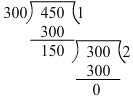
Clearly, the last divisor is 150.
Hence, HCF of the given numbers is 150.
(ii) 399 and 437
We have dividend = 399 and divisor = 437
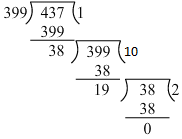
Clearly, the last divisor is 19.
Hence, HCF of the given numbers is 19.
(iii) 1045 and 1520
We have dividend = 1045 and divisor = 1520
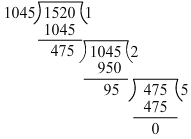
Clearly, the last divisor is 95.
Hence, HCF of the given numbers is 95.
Q.2. Show that the following pairs are co-prime:
(i) 59,97
(ii) 875,1859
(iii) 288,1375
Ans: We know that two numbers are co-primes if their HCF is 1.
(i) 59 and 97
Here, dividend = 97 and divisor = 59
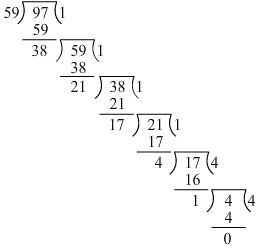
Clearly, the last divisor is 1.
Hence, the given numbers are co-primes.
(ii) 875 and 1859
Here, dividend = 1,859 and divisor = 875
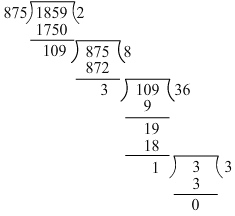
Clearly, the last divisor is 1.
Hence, the given numbers are co-primes.
(iii) 288 and 1375
Here, dividend = 288 and divisor = 1,375
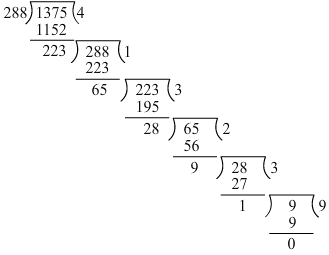
Clearly, the last divisor is 1.
Hence, the given numbers are co-primes.
Q.3. What is the H.C.F of two consecutive numbers?
Ans:
The HCF of two consecutive numbers is 1.
Example:
D = 4 and d = 5 are two consecutive numbers.
Here, we have dividend = 5 and divisor = 4
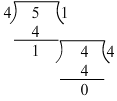
Clearly, the last divisor is 1.
Hence, HCF of 4 and 5 is 1.
Q.4. Write true (T) of false (F) for each of the following statements:
(i) The H.C.F of two distinct prime numbers is 1.
(ii) The H.C.F of two co-prime number is 1.
(iii) The H.C.F of an even and an odd numbers is 1.
(iv) The H.C.F of two consecutive even numbers is 2.
(v) The H.C.F of two consecutive odd numbers is 2.
Ans:
(i) True.
(ii) True.
(iii) False.
HCF of 6 and 9 is 3, not 1.
(iv) True.
(v) False.
HCF of two consecutive odd number is 1.
Example: HCF of 25 and 27 is 1.
|
92 videos|348 docs|54 tests
|

|
Explore Courses for Class 6 exam
|

|

















